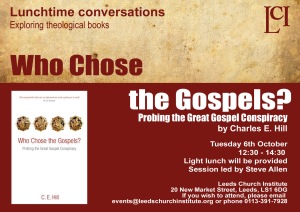 Who Chose the Gospels?
Who Chose the Gospels?
We asked the question in order to probe the ‘Great Gospel Conspiracy’. There is a school of thought, which we see in popular culture by such things as the The Da Vinci Code but supported by some academics such as Elaine Pagels, William Petersen and Bart Erhman (all building on the earlier work of Walter Bauer1) that the four gospels we know today as Matthew, Mark, Luke and John, were not, in the earliest days of the Church regarded as particularly special – or to use theological language, ‘canonical’ or ‘authoritative’ or ‘orthodox’ – or at least, if they were, they were no more so than a lot of other gospels. This school of thought also claims that Matthew, Mark, Luke and John were only established as pre-eminent by the church councils of the 4th or even 5th centuries.
Thanks largely to this school of thought (and the popular media which has sensationalised what it says) the idea is now widespread that in the earliest days of the Church there were dozens, some say hundreds of different gospels and the four now regarded as canonical were not particularly special or indeed, may even have been less highly regarded than some of the others, which were later discarded, or suppressed or simply lost. This school of thought is what lies behind the kind of headline that appeared in The Independent on the 29th July this year – ‘Jesus had a wife say scientists, as ancient papyrus scroll verified’.
If this theory is correct, how did Matthew, Mark, Luke and John come to be regarded so highly and why were the other gospels ‘lost’? That’s where the idea of conspiracy comes in; the theory goes that by various means, both foul and fair, supporters of the four canonical gospels suppressed the other gospels and persecuted those who favoured them, partly because they contained, in their view, erroneous traditions about Jesus but also because they supported a view of church life that they disapproved of. So for example, it is argued that the alternative gospels, as I will mostly call them, supported the idea of female leadership in the Church, which was unacceptable to men. Or, it is argued, these alternative gospels reveal a Jesus who was merely a man and not divine. Or, in the case of the Gospel of Philip, there is a suggestion that Jesus had a sexual relationship with Mary Magdalene. One can easily see how these ideas and the conspiracy theories around them appeal to our contemporary culture which tends to be suspicious of tradition and authority and all too ready to see a conspiracy even where there may not be one. (2)
That there were other gospels should not have come as a great surprise since the existence of other gospels, sometimes called, ‘Gnostic’ or ‘Lost’ gospels, was well-known in the earliest centuries. Indeed, until the actual texts of some these other gospels were discovered in the last 60 years or so, our only knowledge of them came from the pens of early Christians who wrote about them in order to refute them – and in doing so, they occasionally quoted from them too.
C E Hill sums up the conspiracy thus:
…how did the Christian church, apparently drowning in a sea of Gospels, finally end up with only four? … Many [people] picture councils of bad-tempered bishops voting on which books to include one minute and voting to execute heretics the next… many, even in the academic community insist that the question of which Gospels the church ought to endorse was still up for grabs in the fourth century…. the common idea is that the church’s canon is the result of a great power-struggle between rivals among early Christianity…. The four Gospels, like the other books of the …New Testament achieved their place only by finally out-muscling their many competitors. (p2-3).
In his book Who Chose the Gospels? Probing the Great Gospel Conspiracy, CE Hill critically examines the scholarship behind that conspiracy narrative and alternative explanations. At the end of the book, he is completely unconvinced that there was a conspiracy of the powerful to choose the gospels and oppress other versions. He concludes:
We cannot find who chose the Gospels. It looks like nobody did. They almost seem to have chosen themselves through some sort of ‘natural selection’. (p229)….. Christian writers of the second century do not speak of choosing the Gospels … they instead use words like ‘receive’, ‘recognize, ‘confess’, ‘acknowledge’ (p231)…second century church leaders would have said that neither individuals nor churches had the authority to ‘choose’… but to receive the ones given by God and handed down by Christ through his apostles (p246)
At a recent Lunchtime Conversation at LCI led by Revd Steve Allen, a group of us discussed this book. It was intriguing to think about what really happened all those centuries ago and encouraging that so much time and scholarship has gone into getting the most accurate perspective possible. We also reflected on what it means for us in Leeds today; how precious the gospels are to us; and how we have nothing to fear in probing our history to unearth historical facts and truths.
If you would like to read more about the book, Revd Steve Allen has written a succinct summary of the main argument, available as a PDF on this blog site. You can download the PDF here.
